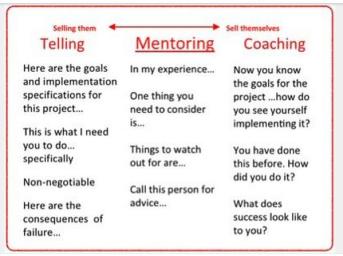
The recent #educoachOC chat on Twitter explored the key differences and similarities between coaching and mentoring as strategies to support teacher learning. I might tease out a few of the issues covered in the chat in future posts but for now I’ll concentrate on the issue of advice giving in a coaching or mentoring context.
There was a lot of discussion around the giving of advice versus not giving advice, and the expectations of both parties when entering into a coaching or mentoring relationship.
I liked Mary Jones‘ use of internal v external expertise and Kerron Worsdell‘s “revelation/epiphany” response. A mentoring relationship (not necessarily with the coach) could be an appropriate form of “external” learning that emerges in response to a need identified within a coaching cycle.


Sam Boswell shared the image below. It’s clear that the ownership and responsibility of the coachee increase as we move to the right.

This brought to mind something that was introduced to me during my coaching accreditation training and that I’ve referred to many times since when trying to explain the coaching process.

The know-how continuum can be a helpful way of thinking about how we frame our coaching questions in order for the coachee to generate options for moving forward. Ideally we want to stay, as long as possible, with the coachee’s own context, experiences and successes. Having fully explored this line of enquiry, or if it turns out not to be fruitful territory, we might move along to another – someone else who they know is good at this or has faced similar challenges or is in a similar context to the coachee. Finally, the last stop on the know-how continuum is the coach. The coach will almost certainly have ideas of their own to help the teacher move towards their goal. However, that’s just what they are – the coach’s ideas – and who’s to say that they are the best ideas? At this point, seeing the coachee struggling to find enough options, the coach might ask “would you like some suggestions?“. Caution and restraint are required on the part of the coach at this stage. A “yes please” response is not a license to immediately flip into full directive mode!

The aim is to keep responsibility and ownership with the coachee. Introducing a suggestion with something like “What I’ve seen work in the past is….“, to some degree, puts the idea out there in neutral territory without the coach claiming ownership of it. This is very different from “Well, what I think you should do is…“. For (teacher) coaches (or perhaps just humans in general!) this can be a difficult thing to do. As Whitmore puts it:
It may be harder to give up instructing than it is to learn to coach
In my own experience as a teacher-coach, maintaining faith in the capacity of the coachee, and resisting telling, have at times been the most challenging aspects of the role. The faith is in their ability (supported by the coaching process) to reflect, think deeply, commit and act. It is not necessarily about surfacing specific knowledge or skill (although it may be there). Effective coaching helps the coachee to realise that they have the capacity to find a way to solve the problem or address their need. It is not always about knowing the answer there and then – “know-how” in this context can be knowing how to find their own answers.
So how does this sit with you? What’s your experience as a coach or coachee? What questions would you ask at different points on the know-how continuum? How do designated Instructional Coaches (more common in the US) manage to keep responsibility and ownership with the coachee when operating in a more directive way around specific instructional strategies?
Further Reading:
Mark McKergow discusses the “know-how continuum” as a Solutions Focussed approach in these two great articles:
Manager as coach – gathering know-how for improved performance
Manager as coach – introducing the coach’s know-how Part 2
Thanks to Jason Pascoe (@jpgci) for sharing these.
Reference:
Whitmore, J. (2009). Coaching for performance: GROWing human potential and purpose, the principles and practice of coaching and leadership (4th ed.). London, England: Nicholas Brealey Publishing.









